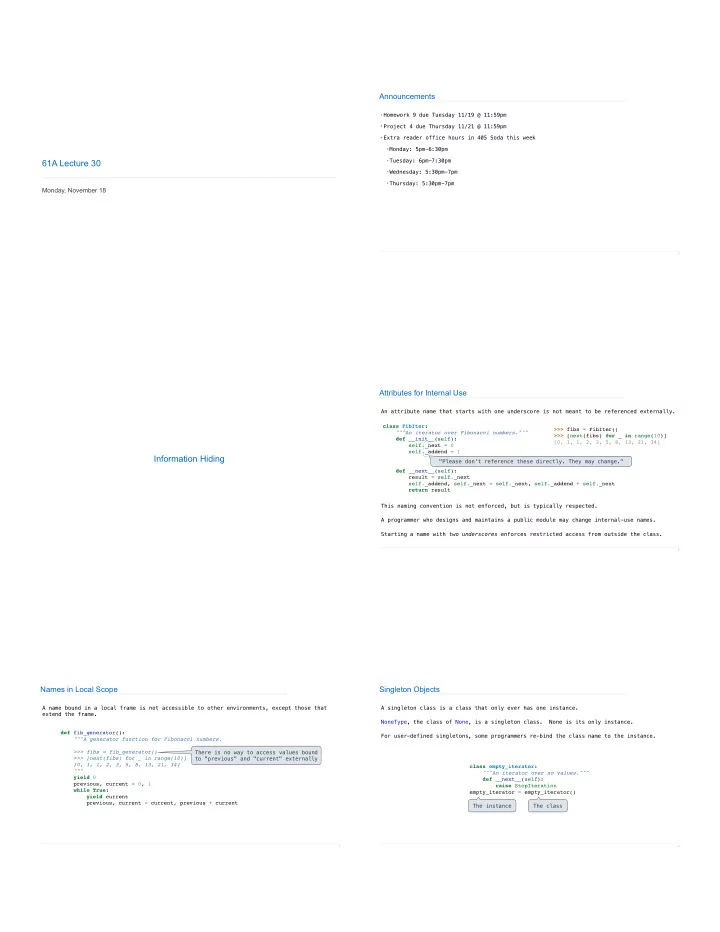

Announcements • Homework 9 due Tuesday 11/19 @ 11:59pm • Project 4 due Thursday 11/21 @ 11:59pm • Extra reader office hours in 405 Soda this week ! Monday: 5pm-6:30pm ! Tuesday: 6pm-7:30pm 61A Lecture 30 ! Wednesday: 5:30pm-7pm ! Thursday: 5:30pm-7pm Monday, November 18 2 Attributes for Internal Use An attribute name that starts with one underscore is not meant to be referenced externally. class FibIter : >>> fibs = FibIter() """An iterator over Fibonacci numbers.""" >>> [next(fibs) for _ in range(10)] def __init__(self): [0, 1, 1, 2, 3, 5, 8, 13, 21, 34] self._next = 0 self._addend = 1 Information Hiding "Please don't reference these directly. They may change." def __next__(self): result = self._next self._addend, self._next = self._next, self._addend + self._next return result This naming convention is not enforced, but is typically respected. A programmer who designs and maintains a public module may change internal-use names. Starting a name with two underscores enforces restricted access from outside the class. 4 Names in Local Scope Singleton Objects A name bound in a local frame is not accessible to other environments, except those that A singleton class is a class that only ever has one instance. extend the frame. NoneType, the class of None, is a singleton class. None is its only instance. def fib_generator(): For user-defined singletons, some programmers re-bind the class name to the instance. """A generator function for Fibonacci numbers. There is no way to access values bound >>> fibs = fib_generator() >>> [next(fibs) for _ in range(10)] to "previous" and "current" externally [0, 1, 1, 2, 3, 5, 8, 13, 21, 34] class empty_iterator : """ """An iterator over no values.""" yield 0 def __next__(self): previous, current = 0, 1 raise StopIteration while True : empty_iterator = empty_iterator() yield current previous, current = current, previous + current The instance The class 5 6
Streams are Lazy Recursive Lists A stream is a recursive list, but the rest of the list is computed on demand. Second element is First element an Rlist or can be anything Rlist.empty Rlist( __________________ , __________________ ) Streams Second element is a zero-argument function that First element returns a Stream can be anything or Stream.empty Stream( __________________ , __________________ ) Once created, Streams and Rlists can be used interchangeably using first and rest methods. (Demo) 8 Integer Stream An integer stream is a stream of consecutive integers. An integer stream starting at first is constructed from first and a function compute_rest that returns the integer stream starting at first+1. def integer_stream(first=1): """Return a stream of consecutive integers, starting with first. Stream Processing >>> s = integer_stream(3) >>> s.first 3 >>> s.rest.first 4 """ " (Demo) def compute_rest(): return integer_stream(first+1) return Stream(first, compute_rest) (Demo) 9 Stream Implementation A stream is a recursive list with an explicit first element and a rest-of-the-list that is computed lazily. class Stream: """A lazily computed recursive list.""" class empty: def __repr__(self): Stream Implementation return 'Stream.empty' empty = empty() def __init__(self, first, compute_rest=lambda: Stream.empty): assert callable(compute_rest), 'compute_rest must be callable.' self.first = first self._compute_rest = compute_rest @property def rest(self): """Return the rest of the stream, computing it if necessary.""" if self._compute_rest is not None: self._rest = self._compute_rest() self._compute_rest = None return self._rest 12
Mapping a Function over a Stream Mapping a function over a stream applies a function only to the first element right away. The rest is computed lazily. def map_stream(fn, s): """Map a function fn over the elements of a stream s.""" if s is Stream.empty: Higher-Order Functions on Streams This body is not return s executed until def compute_rest(): compute_rest is called return map_stream(fn, s.rest) return Stream(fn(s.first), compute_rest) Not called yet >>> s = integer_stream(3) >>> s Stream(3, <...>) >>> m = map_stream( lambda x: x*x, s) >>> first_k(m, 5) [9, 16, 25, 36, 49] 14 Filtering a Stream A Stream of Primes When filtering a stream, processing continues until an element is kept in the output. The stream of integers not divisible by any k <= n is: • The stream of integers not divisible by any k < n, • Filtered to remove any element divisible by n. def filter_stream(fn, s): """Filter stream s with predicate function fn.""" • This recurrence is called the Sieve of Eratosthenes. if s is Stream.empty: return s def compute_rest(): 2, 3, 4, 5, 6, 7, 8, 9, 10, 11, 12, 13 return filter_stream(fn, s.rest) if fn(s.first): return Stream(s.first, compute_rest) else: return compute_rest() (Demo) Actually compute the rest 15 16
Recommend
More recommend